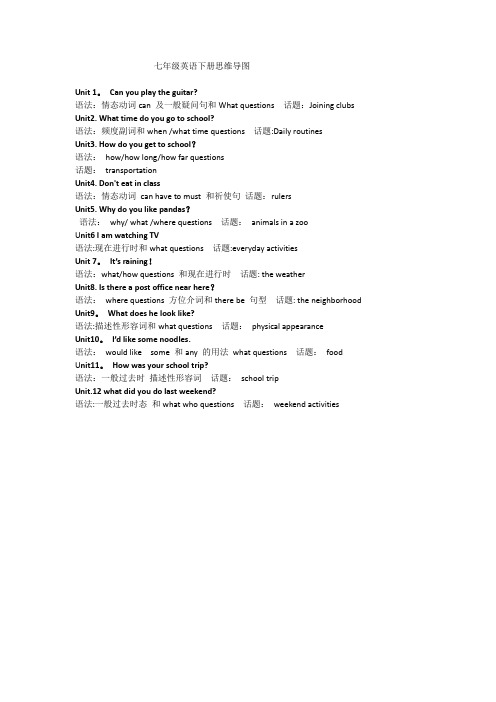七年级英语思维导图样板
人教版七年级上册英语Unit3_单元主题思维导图(共7张PPT)

Things in the classroom
Section B
What about/How about…?
Words
表示感谢及应答
—Thank you for… —You’re welcome.
School things: pencil, pen, pencil box, schoolbag, ruler, book, eraser, watch, bag, baseball, computer, notebook, dictionary
单元整体话题篇
询问拼写的句型
How do you spell…? Can you spell…?
向某人求助
…ask…for help
给某人打电话
Call…at…
给某人发电子邮件
E-mall…at…
课件PPT
请领导老师批评指正
含be动词的 一般疑问句
语法篇-含be动词的一般疑问句
1 结构 2 答语
be动词(am/is/are)+主语+其他?
肯定回答 Yes,主语+ be动词(am/is/are)
注意:主语和be动词不能缩写
否定回答 No, 主语+ be动词(am/is/are)+not
一提
将be动词提到句首,首字母大写
询问物品归属
mine, yours, his, hers
A: Is this/that…? B: Yes, it is./No, it isn’t.
物主代词
A: Are these/those your… B: Yes, they are./No, they aren’t.
Section A
人教版七年级下英语各单元主题思维导图

初中英语人教版七年级下
Unit2 What time do you go to school?
单元主题思维导图
Daily routines
日常作息习惯
对话篇 ng job Radio station What time…?
Scott:
12:00 —6:00
Interviewer: What time…get up?
Scott:
at 8:30
breakfast at 9:00
Interviewer: a funny time
Scott: Interviewer:
Scott:
exercise at 10:20
When do you go to work? 11:00/ never late for work
sports club
What…can you play?
soccer
join the soccer club
be good at tell story story telling club
like to draw
join two clubs
Let’s join now!
What can they do?
阅读篇 SectionB-2b
Place
The old people’s home The Student’s Sports Center
Requirements
Contact
Be free in July
Be _g_o__o_d_w__i_th__ old people
Can talk to them and play games with them
doesn’t like to get up early eating breakfast quickly having _h_a_m_b_u_r_g_e_r_s for lunch
人教版(五四制)七年级上英语主题思维导图

语法篇-现在进行时
现在进行时
含义
用来描述现在正在发生的动作或存在的状态。
构成
be+现在分词
现在分词 的变化规律
直接在动词原形末尾加-ing 以不发音的字母e结尾的动词,去e加-ing 以重读闭音节结尾的从此,且词尾只有一个辅 音字母,双写再加-ing
looking making running stopping
A: What are you doing? B: I’m watching TV.
A: What’s she doing?
B: She’s washing her clothes.
A: Is he reading a newspaper?
B:Yes he is. / No, he isn’t. He’s playing basketball.
人教版(五四制)七年级上英语 各单元主题思维导图
人教版(五四制)七年级上英语
Unit1 Why do you like pandas?
单元主题思维导图
Talk about animals
Jenny: dog/cute Peter: pet Dingding smart Jenny: What can he do? Peter: walk on two legs dance Jenny: Wow! Peter: Does your family have a pet? Jenny: boring sleep all day Lazy Peter: a good name
A: Are they using the computer?
B: Yes, they are. / No, they aren’t. They’re exercising.
人教版七年级英语上册Unit8_单元主题思维导图

On November 30th, _a_n_E_n_g_l_is_h__p_a_rt_y__
On November 3rd, _a_n__a_rt_f_e_s_ti_v_a_l ___
构成
序数词
用法
语法篇-序数词的用法
1)1-3逐个记,分别是:first, second, third. 2)4-19,相应基数词+th。(fifth, eighth, ninth, twelth 为特殊形式) 3)20-90之间“第几十”,y变成ie加th。 4)21-99之间“第几十几”,只把个位变序数词。
1)序数词前面通常加定冠词the。 2)序数词前用不定冠词,表示“又一,再一”。 3)如果序数词前面有物主代词或其他修饰语,则不用
任何冠词。
-’s所有格
通常用于“有生命 的名词”
Mary’s book
玛丽的书
名词所有格
of所有格
通常用于“无生命 的名词”
a map of China
一副中国地图
语法篇-名词所有格
first—thirty-first
at three this afternoon, this term, next month, next week
初中英语人教版七年级上 Unit8 When is your birthday?
单元主题思维导图
Talk about dates
When is your birthday?
功能对话篇
A: When is your birthday? B: It's on January 5th.
A: When is your father's birthday? B: His birthday is on April 2Ist.
七年级下册英语全册思维导图

七年级下册英语全册思维导图Unit 1: These are my teachers.•Vocabulary–school subjects–teachers–classroom objects–adjectives to describe people•Grammar–subject pronouns and possessive pronouns–using ‘be’ to describe people and things–using ‘have’ to show possession–asking and answering questions using ‘wh-’ words•Skills–introducing people–talking about school subjects and teachers–describing people–asking and answering questions about possessionUnit 2: This is my school.•Vocabulary–places in a school–prepositions of place–numbers 1-1000–adverbs of frequency•Grammar–using ‘there is’ and ‘there are’–using the verb ‘have’ with objects and rooms–using prepositions to describe location–forming questions with ‘where’ and giving answers•Skills–talking about your school–giving directions in a school–describing locations–asking and answering questions about places Unit 3: How do you study for a test?•Vocabulary–school activities and supplies–adverbs of manner–adjectives to describe actions–time expressions•Grammar–using present simple tense to talk about routines and habits–using adverbs of manner to describe how things are done–using adjectives to describe actions–using time expressions to talk about frequency •Skills–talking about daily routines–discussing how to study for a test–describing actions using adjectives–expressing frequency using adverbsUnit 4: I love learning English!•Vocabulary–adjectives describing feelings–types of music–activities–opinions•Grammar–using present continuous tense to talk about actions happening now–using ‘like’, ‘love’, ‘enjoy’ to talk about hobbies and activities–using adjectives to describe feelings–expressing opinions using ‘I think’, ‘I believe’•Skills–talking about hobbies and activities–expressing likes and dislikes–describing feelings–giving opinionsUnit 5: How’s the weather?•Vocabulary–weather conditions–seasons–types of clothing•Grammar–using present simple tense to talk about weather–using ‘it’ to refer to the weather–using prepositional phrases to describe weather conditions•Skills–talking about the weather–describing seasons and clothing–making predictions about the weather–giving weather forecastsUnit 6: What’s your favorite day?•Vocabulary–days of the week–activities–ordinal numbers–adjectives to describe activities•Grammar–using ‘what’ to ask about favorite things–using ordinal numbers to talk about the order of days–using adjectives to describe activities •Skills–talking about favorite activities–discussing daily routines on different days–using ordinal numbers–describing activities using adjectivesUnit 7: I want to be a basketball player.•Vocabulary–jobs–sports–school subjects related to jobs–adjectives to describe jobs•Grammar–using ‘want to’ to talk about future plans–using ‘be going to’ to talk about future intentions–using adjectives to describe jobs–using ‘because’ to give reasons•Skills–talking about future plans and intentions–discussing different jobs–describing jobs using adjectives–giving reasons using ‘because’Unit 8: Where’s the post office?•Vocabulary–places in a city–directions–prepositions of movement–adjectives to describe cities•Grammar–using ‘Can you…’ to ask for help–using imperatives to give instructions–using prepositions of movement to give directions–using ‘there is’ and ‘there are’ to talk about places in a city•Skills–asking for and giving directions–describing places in a city–using imperatives to give instructions–talking about different citiesUnit 9: How do you make a banana smoothie?•Vocabulary–food and drinks–kitchen utensils–imperatives for cooking–adjectives to describe food and taste •Grammar–using imperatives to give instructions for cooking–using ‘how much’ and ‘how many’ to ask about quantities–using adjectives to describe food and taste–using ‘like’ to express preferences•Skills–talking about cooking and food preferences–giving instructions for making a recipe–describing food and taste–asking about quantitiesUnit 10: I’m watching TV.•Vocabulary–activities–types of TV programs–time expressions–adjectives to describe TV programs •Grammar–using present continuous tense to talk about actions happening now未知驱动探索,专注成就专业–using adjectives to describe TV programs–using time expressions to talk about frequency •Skills–discussing TV programs and activities–talking about what is happening now–describing TV programs using adjectives–expressing frequency of activities11。
新目标人教版七年级上册英语Unit1_单元主题思维导图(共6张PPT)

be动词
人称 第一人称 第二人称
第三人称
主语与be动词
主语
单数 I 复数 we
单数 You 复数 You
单数 He She It
复数 They
be动词
单数 am 复数 are
单数 are 复数 are
单数 is is is复数arebe动词的句式结构
肯定句 口诀主助记语+be动词+……
我(I)用am ,你(you)用are, is连着他(he)她(she)它(it)
单元主题思维导图
Making new friends
Linda:
Helen: Linda: Helen: Linda: Helen:
Good afternoon! _M__y_n_a_m__e_’s_ Linda. _A_r_e_y_o_u_ Helen? Yes, _I_a_m__. Nice to meet you, Linda. Nice to meet you, too. __W_h_a_t_’s__h_e_r name? _S_h_e_’s__ Jane. _I_s_h_e_ Jack? No, _h_e_i_s_n_’t_. _H_i_s_n_a_m__e_’s_ Mike.
Introduce yourself and your friends (names/phone No.)
Jenny Green Gina Smith
281-9176 232-4672
Dale Miller
358-6344
Eric Brown Mary Brown Zhang Mingming
357-5689 257-8900 929-3155
be动词主语与be动词be动词的句式结构人称主语be动词第一人称第二人称第三人称单数i复数we单数am复数are单数you复数you单数are复数are单数he复数they单数is复数aresheitisis肯定句否定句疑问句be动词主语
人教版七年级上英语各单元主题思维导图

Numbers
Names
Last name
Brown, Miller, Green, Smith
zero, one, two, three, four, five, six, seven, eight, nine
First names
Gina, Jenny, Mary, Linda, Jane, Alan, Tom, Mike, Jack
Furniture
table, bed, sofa, chair, desk, bookcase,…
Unit5 Do you have a soccer ball?
单元主题思维导图
询问并描述物 品所属关系
Cindy: Hey. Helen, let's go! _W__e_’r_e_l_a_te__! Helen: OK. Cindy: _D_o__y_o_u_h_a_v_e__a_p_i_n_g_-p_o_n_g__b_a_t_? Helen: _Y_e_s,_I_d_o_. It's in my bag. Cindy: And_w__h_e_r_e_'s_o_u_r__b_a_se_b_a_l_l_b_a_t__? Helen: Bill has it. Cindy: Oh, yeah. And__d_o_y_o_u__h_a_ve__y_o_u_r_j_a_ck_e_t_? Helen:_O_h_,_n_o_,_I_d_o__n_'t_. It's on the chair. Let me get it. Cindy: And your hat, too! Helen: OK,I_h_a_v_e__m_y__ja_c_k_e_t_a_n_d__h_a_t . Let's go !
人教版七年级下英语各单元主题思维导图

对话篇 SectionA-2d
Lisa: usually take the bus
Jane: How far from…to…
Lisa: takes about 20 minutes How long…? Jane: 15mins by bike
Lisa: have a good day Jane: You, too.
What time/ when引导的 特殊疑问句
2021/7/26
2 询问具体时间时,即几点几分,只能用what time,不能用when。
—What time is it? — It’s seven o’clock.
3 询问年份、月份、日期时,只能用when,不能用what time。
— When is the Music Festival? — It’s on January 2nd.
初中英语人教版七年级下
Unit2 What time do you go to school?
单元主题思维导图
2021/7/26
Daily routines
日常作息习惯
对话篇 Sec2t0io21n/A7/-226d
Interviewer: interesting job Radio station What time…?
他
一般疑问句 Should I open the door? Should+主语+V原+其他?
特殊疑问句 When should we go? 特殊疑问句+should+主语+V原+其
他?
swim, play basketball/ tennis/volleyball
Sports
七下思维导图

七年级英语下册思维导图Unit 1。
Can you play the guitar?语法:情态动词can 及一般疑问句和What questions 话题:Joining clubs Unit2. What time do you go to school?语法:频度副词和when /what time questions 话题:Daily routinesUnit3. How do you get to school?语法:how/how long/how far questions话题:transportationUnit4. Don't eat in class语法:情态动词can have to must 和祈使句话题:rulersUnit5. Why do you like pandas?语法:why/ what /where questions 话题:animals in a zooU nit6 I am watching TV语法:现在进行时和what questions 话题:everyday activitiesUnit 7。
It’s raining!语法:what/how questions 和现在进行时话题: the weatherUnit8. Is there a post office near here?语法:where questions 方位介词和there be 句型话题: the neighborhood Unit9。
What does he look like?语法:描述性形容词和what questions 话题:physical appearanceUnit10。
I’d like some noodles.语法:would like some 和any 的用法what questions 话题:foodU nit11。
How was your school trip?语法:一般过去时描述性形容词话题:school tripUnit.12 what did you do last weekend?语法:一般过去时态和what who questions 话题:weekend activities。
七年级英语思维导图1到3单元

The earth Seasons
可数名词
可数名词复数形式变化
不可数名词
表示某地存在某物
There be 存在句的用法
遵循"就近原则"
注意与have的区别
名词前形容词的用法
to be+形容词的用法
It is +形容词 for sb to do sth
be going to+动词原形
will+动词原形
用“be going to+动词原形”表示打算和预测。
用现在进行时(即be动词+现在分词)表示将来,这一结构常用于表示位置转移或行 程安排的动词,如come , go , leave, fly, move, arrive, start等。 例如:I'm leaving for Tibet on Sunday. 星期天我要去西藏。
两者区别
there be句型的一般将来时是将will / be going to放在there be之间,即:There will/be going to be…
注意
条件状语从句,表示主句动作发生所需要的条件,由连接词if (如果)、as long as (只要)或unless(除非)等引导的句子做状语。
沪教版七年级上册
unit 1 My Life
特殊疑问词的用法
Making friends
Daily Life
a 不定冠词
an 一般现在时
表示频率的副词以及副词词组
who what when how why where
用于元音字母开头的名词前
often usually never sometime
unit 2 The national world
